Less than a week away from the 2015 General Election and Labour Party strategy is still unclear
All is not well within the leadership team. The uneasy truce between Ed Balls, Douglas Alexander, Yvette Cooper, Jonathan Cruddas and Ed Miliband is not fit for purpose and there are indications that the Party is becoming resigned to defeat. It ended up in this state because the persons concerned failed to agree the share of power and accountability. Strategies favoured by each of the policy shapers:
* Ed Balls, his wife Yvette Cooper and Douglas Alexander:
Assume loyalty of the working class is a given and concentrate efforts on swing voters, (5%-10%)? Volatile and risky but winning the swingers over would provide enough votes allowing the Party to form a government without need for assistance from any other party.
* Jonathan Cruddas, Labour’s Policy Coordinator:
Pursue a policy of containment, work hard and regain the working class vote so badly neglected by the Blair and Brown governments? If successful the Party would benefit from a return of around 31%. Insufficient to form a government but perhaps sufficient to form a coalition with the Liberals or SNP or both.
Milibands quandry. Returns indicate the Party is in poor shape in Scotland. It is possible 20-50 seats could be lost to the SNP. The Liberals are also in decline being punished for supporting the Tory Party over the last 5 years so there is no guarantee they will gather sufficient MP’s to provide enough support allowing the Labour Party to form a government.
Option One chosen: Assume loyalty of the working class is a given and concentrate efforts on swing voters, (5%-10%)?
So who will win the day? Cameron’s strategy of divide then rule is well tried, tested and has had it’s successes. But the dividing weapon needs to be secure. If it is vulnerable it can be redirected. The divider he is using is Scotland, but demonising the SNP designed to generate ill-will in England against the Scots polarising opinion in favour of Cameron may well alienate Scot’s living in England in significant numbers.
Taking the Tory Party to the centre ground allows UKIP free reign over the extreme right of the Tory and labour Party’s. Cameron’s projection is that he will be assured of the support of any MP’s from this source which, with the addition of the Lib/Dem’s will provide him with MP’s in numbers sufficient to gain a majority but the numbers might fall short.
This leaves the left as the only ground in England, within which the labour Party can operate reasonably freely, but the upsurge in the fortunes of the SNP forces a move away from option one to option two. The Labour party will need to work very hard in the last few day’s to regain the English working class vote.
Miliband remains hopeful the late change in strategy will provide Labour with enough MP’s to form a coalition minority government together with the Lib/Dem’s, Plaid Cymru and a few MP’s from NI. The minority government would be provided with assurances from the SNP they would not use wrecking tactics against it.
The most likely outcome of the election is a Labour minority government and it is crucial that Scotland returns the maximum number of SNP MP’s so that they will be able to exert influence on the new government bringing forward policies favourable to Scotland.
A look back at events from 2010-15 is useful, being a source of information explaining the apparent failure of the Labour Party, (handed all of the advantages of being in opposition against an unpopular coalition government) to make gains.
The Expenses Scandal
2007: With his wife Yvette Cooper, Ed Balls was accused of “breaking the spirit of Commons rules” using MPs’ allowances to help pay for a £655,000 home in North London. It was alleged that they bought a four-bed house in Stoke Newington, North London, and registered it as their second home (rather than their home in Castleford, West Yorkshire) in order to qualify for up to £44,000 a year subsidising a reported £438,000 mortgage under the Commons Additional Costs Allowance. This is despite both spouses working in London full-time and their children attending local London schools. http://aangirfan.blogspot.co.uk/2008/10/balls-sex-and-nazis.html
The Rise of the SPADS
2010: Cabinet members appear out of nowhere. Peter Mandelson fiddles with his controls and yet another cloned version of himself shimmers into life. Yet another yes man or woman who can “send the right message” but avoid “doing the right thing”.
The background of successful cabinet members is strikingly similar. The typical New Labour apparatchik starts by studying Philosophy, Politics and Economics at university (known as PPE). After graduation they rattle around in law or journalism for a short time before landing a job as a SPAD for an incumbent cabinet minister.
The successful ones keep their heads down, control the media agenda and impress their boss they are then shuffled onto the candidate list of a Labour safe seat over the heads of local party members with the nod that this candidate has the favour of senior ministers. Bob’s your uncle they are members of parliament and on their way to cabinet.
Consider a potted Curriculum Vitae of three of the recent Labour Party leadership front runners:
* David Milliband: The National Council for Voluntary Organisations, the Commission on Social Justice then Tony Blair’s Head of Policy.
* Ed Balls: The Financial Times and then economic adviser to the then Shadow Chancellor Gordon Brown.
* Ed Miliband: Brief career in television journalism then speech writer and researcher for Harriet Harman.
The three enjoyed no reputation within the Labour movement and little experience in the workplace. But they were shoe-horned into power equipped only with theoretical knowledge combined with an arrogant self riotousness born from ambition.
They profess to know a lot but they understand nothing. They have no feel for the issues which they discuss because they have never engaged with the world in any real way.
When they debate a workers rights or a company’s bottom line they do not understand the obstacles faced by a working man or the imperatives of business. Everything is an abstraction to be air brushed away by some glib sound byte or grand scheme masterminded by a theorist and managed by a consultant.
How did Douglas Alexander become an MP let alone Secretary of State for International Development?
As always it’s not what you know but who you know. The shadow Trade and Industry Secretary for whom Mr. Alexander worked as a SPAD was none other than Gordon Brown, (though his friendship with Tony Blair did him no harm).
There is a place in politics for people who understand the media but that place is not making policy and if parties continue to allow ministers to choose their successors then we shall become the worlds first nemocracy – A nation ruled by nobodies.
http://talkingbollocks.net/2010/04/24/nemocracy-in-the-uk-%E2%80%93-government-by-nobodies/
2011: Ed Balls appointed to the key role of Shadow Chancellor
He faced the challenge of establishing his own political identity having first exercised influence as an unelected player in a powerful political partnership. The Brown-Balls era from 1997 to 2004 was near enough a political marriage. He has a public reputation as a polarising politician, not afraid of political combat and he has also been the Labour figure keenest to take on the Conservatives on the major political clashes of the day.
Balls unsuccessful in his bid to lead the Party in the 2010 Labour leadership race because of a perception of incumbency. He was perceived to offer continuity rather than change, enabling opponents to mobilise new cohorts of activists and members in particular. His reputation is one of experience and expertise and he is acknowledged by friend and foe to be Labour’s most formidable economist.
The alliance between the two Eds is not ideal and there are some who despair about the inevitability of a repeat of Blair – Brown tensions between the two Eds. There are others who are concerned about the creation of another, “Brownite” takeover.
But Balls is an able political strategist and he is certainly unlikely to act to the caricature his opponents paint. He is well capable of forging some cross-cutting alliances. He was, for example, a key influence in the decision not to join the euro.
As Shadow Chancellor his duty is to contest the economic strategy of the government. His challenge is to do so in a way that continues to shift public opinion against government claims that the current approach is both necessary and fair.
Though one of the big beasts of the Westminster jungle he remains relatively unknown to the general British public and it is difficult to decide with any degree of confidence if he is an asset or liability to his party. http://www.nextleft.org/2011/01/on-ed-balls-as-hillary-clinton.html
2011: Documents show the key role played by the Shadow Chancellor Ed Balls in a “brutal” plot to destroy Tony Blair, and how Gordon Brown ignored warnings over the profligacy of Labour’s spending plans and the damaging impact of key tax policies.
http://www.telegraph.co.uk/news/8566987/Labour-coup-The-Ed-Balls-files-database.html
2011: A large number of documents including private letters between Tony Blair and Gordon Brown reveal the rift at the heart of Labour after the 2005 general election, and how Gordon Brown pushed ahead with plans to spend billions of pounds of extra taxpayers’ money despite being warned that it was being wasted.
2011: Did Ed Balls apologise for policy errors the labour Party made in government? Not quite. He made a fairly vague, half hearted apology but omitted mention of;
* Selling Gold reserves on the cheap, losing tens of billions in the process.
* Creating an employment market where immigrants got preference over the indiginous population as 66% of new jobs under Labour went to immigrants.
* Creating a housing policy where first time buyers are locked out of the market.
* Removing MIRAS but relaxing rules on tenant landlords and allowing them tax relief.
* Increasing Public Sector waste faster than Public spending:
* Twelve billion on failed NHS IT project.
* Billions more on dodgy PFI contracts
* Billions more on pointless jobs i.e. Health and safety co-ordinators, Political correctness monitors of the work place.
* Hundreds of millions for trades union modernisation.
2011: One reason Mr Balls performed so poorly in last year’s Labour leadership elections – coming a distant third behind both Miliband brothers was his contamination because of his association with Mr Brown.
Even if the general public might not have entirely understood the relationship, those in the party did. Mr Balls is a clever man, but he puts his considerable intelligence to uses that do not always further the truth.
He seems to have that old Stalinist trait, once so popular in his party, of arguing whatever serves the interests of the party, irrespective of where it sits with any principles he might have. It took some gall on his part, not that anyone has ever accused him of lacking that, to talk about the adverse effect that the Coalition’s policies were having on unemployment.
2011: Labour leader Ed Miliband used a Labour Friends of Israel lunch this week to emphasise his family connection to the country that gave refuge to his grandmother.
In a highly personal speech to mark the publication by LFI of a collection of essays entitled Making the Progressive Case for Israel, he said: “I wouldn’t be here today if it weren’t for the state of Israel”. His mother’s family were sheltered by Polish Catholics during the Holocaust, and his grandmother later settled in Israel.
Mr Miliband also spoke about an emotional visit he had made to Yad Vashem with his mother to memorialise the Polish rescuers on the “Avenue of the Righteous”. In a speech clearly aimed to allay fears that Mr Miliband did not have the same commitment to Israel as his predecessors Gordon Brown and Tony Blair, the Labour leader emphasised his admiration for Israeli democracy.
The audience included key members of the New Labour aristocracy, including Douglas Alexander, Ed Balls, Yvette Cooper, Tessa Jowell and Alan Johnson as well as rising stars such as Luciana Berger, Mary Creagh, Michael Dugher, Rachel Reeves and LFI chair John Woodcock.
http://www.thejc.com/news/uk-news/58414/ed-milibands-links-israel
2012: An experienced Labour representative admits: “Now’s not the time to climb the greasy pole. It’s probably going to be eight years before we’re back in power. We’re not hungry enough for it yet.”
Another MP, with a wry laugh, adds simply: “We don’t have enough power to have power bases.” That may be the case, but an examination of the current party dynamic is important.
Without further ado, let’s shed some light on the “hard yards of opposition”. The Players; Ed Miliband, Ed Balls and Yvette Cooper, David Miliband, Alistair Darling, Jim Murphy, Douglas Alexander and Tom Watson. Unlike Tony and Gordon’s meal-deal, forces are at work to ensure the next Labour takeover will not leave the party with an upset stomach for quite so long.
http://www.totalpolitics.com/articles/298832/interrogating-labourand39s-power-bases.thtml
2014: In these European elections Labour is clear that walking away from our biggest market, the European Union, would be bad for our economy. We are much better placed to shape Europe’s future, fight for our national interest and back businesses and jobs if we are fully engaged rather than having one foot out of the door.
The status quo is not good enough. We need to see real change in Europe to respond to public concerns, deliver better value for money for taxpayers and secure rising prosperity.
2014: Labour’s pledge to introduce ‘tough fiscal rules’ is branded a sham as a report warned that the party would still be free to go on a £28billion spending spree after the next election.
Shadow Chancellor Ed Balls attempted to repair Labour’s battered economic reputation earlier this year by announcing a ‘binding fiscal commitment’ to get day-to-day government spending out of the red by 2020.
But yesterday a report by the respected Institute for Fiscal Studies said the pledge fell well short of George Osborne’s promise to bring total government spending back into the black over the same period.
The study said Labour’s plans would allow Mr Balls to spend £28billion more than the Chancellor over the course of the next parliament, all of it borrowed.
But the IFS warned that it would also burden future generations with even more crippling levels of debt. A Treasury source said: ‘This analysis confirms Labour haven’t learned their lesson – their policy would mean £28billion of additional borrowing.
This would mean higher taxes, higher mortgage rates – and would risk Britain’s future economic security. They must never be allowed anywhere near our economy again.’ Tory MP Charlie Elphicke branded Mr Balls a ‘spendaholic’. He added: ‘This report shows that Labour’s claim it is getting serious about the economy is a sham. They are addicted to spending, borrowing and debt.’
The IFS report reveals that Britain faces years more austerity, whichever party wins the next election. Tory plans would require £46.3billion of cuts during the parliament, only £8.7billion of which have been spelt out so far.
2014: The U.K. Labour Party hardened its opposition to leaving the European Union, drawing a dividing line with Prime Minister David Cameron’s Conservatives less than eight months before next year’s national elections.
Labour’s spokesmen on finance and on foreign affairs, Ed Balls and Douglas Alexander respectively, used separate speeches to the party’s annual convention in Manchester, Northwest England, today to stress the economic gains of remaining in the 28-nation EU and warn the governing Tories against harming the national interest by exiting the bloc. “We’re not going to earn our way to higher living standards by walking away from our biggest single market,” Balls said. “Let us say loud and clear, walking away from Europe would be a disaster for British jobs and investment.”
http://www.businessweek.com/news/2014-09-22/labour-warns-of-eu-exit-disaster-as-election-lines-drawn
2014: John Prescott accuses Ed Miliband of showing a severe lack of ambition and of delivering an underwhelming party conference performance:
In his last party conference speech before the General Election, Mr Miliband set out his intention to put the NHS at the heart of the party’s plan for the next 10 years.
However, speaking without notes, he left out entirely a passage on reducing the country’s £75bn deficit.
Mr Prescott said the Opposition leadership appeared to have resigned itself to not winning an overall majority at the 2015 general election and was seeking only to shore up its “core vote”. “Ed seems to be pursuing a core vote strategy of getting 31% of traditional Labour supporters with a few ex-Lib Dem voters,” the former deputy prime minister wrote in the Sunday Mirror.
Ed Balls hit back at Lord Prescott’s criticism and said: “John Prescott is a fighter. Sometimes literally.” He added: “John is clear in his article that we should learn from 1997 and I agree. “The lesson we learned in 1997, when John and I worked together, is if you as a party come along – which happened in previous elections for us before 97 – with promises which couldn’t be paid for then you get into trouble. “Everything in 97 was costed and paid for, everything in 2015 costed and paid for, no spending requiring more borrowing. “The people who are making unfunded commitments are now the Tories and the Liberal Democrats.”
http://news.sky.com/story/1347614/prescott-criticises-milibands-timid-approach
2014: 80% of Conservative MPs are thought to be members of Conservative Friends of Israel, (AFP). But Shadow Foreign Secretary Douglas Alexander is said to have made the decision that the Labour Party will support a motion recognising Palestine. Alexander has previously said “Palestinian statehood is not a gift to be given, but a right to be recognised.”
Supporters of Labour for Israel, (LFI) against the motion, include shadow Chancellor Ed Balls and shadow ministers Caroline Flint, Jim Murphy and Liam Byrne all members of the LFI group.
2015: The inside story of the Labour reshuffle that never was.
Interesting rumours have been trickling out of the PLP and Labour HQ over the past fortnight about the seemingly imminent reshuffle. Uncut has pieced together various accounts to give a view of just what has been going on.
Earlier this month, amid the fall-out from the Scottish referendum and Labour conference, as MPs’ discontent with Ed Miliband bubbled up into the press, a plan was hatched by the leader’s inner circle.
A move so bold that it would reset the political clock, seize the attention of the journalists and demonstrate Ed Miliband’s leadership credentials.
A long awaited reshuffle was overdue and its centre-piece was to be Ed Balls’ ejection from his brief as shadow chancellor.
Tensions between the leader’s office and Ed Balls’ team have been well-documented.
Ed Balls was not Miliband’s first choice as shadow chancellor – that was Alan Johnson – and from the leaked e-mails last year, where Ed Balls was described as a “nightmare,” by Miliband’s advisers, to the two Eds’ splits over whether to retain the 50p rate of tax and their widely aired disagreement on whether to back or bin HS2, the relationship has always been uneasy.
With Labour trailing the Tories by twenty points on the economy and discontent on the left and right of the party with Labour’s economic offer, the rationale for action was obvious.
Balls’ potential destination was unclear. One option canvassed was foreign secretary with Douglas Alexander becoming a full time general election co-ordinator.
However, the preferred choice was a switch to home affairs, with his wife, Yvette Cooper, becoming shadow chancellor. Come what may, Ed Balls would have been furious, but to cause trouble in the run-up to the general election would have been difficult.
All the more so, if his wife was the shadow chancellor, a role it would have been difficult for Cooper to turn down, especially given her own ambitions to lead the Party if Labour is defeated next year.
2014: Kevin Maguire in the New Statesman in 2011 suggested the tension between the two Eds has been there for while:
“A BlackBerry ban isn’t exactly a Clause Four moment but Ed Miliband needs to start somewhere to stamp his authority on Labour.
During a shadow cabinet meeting not every frontbencher listened raptly as Ted addressed his lieutenants.
The young leader was miffed to see his former Treasury line manager, Ed “Bruiser” Balls, more engrossed in sending texts and emails.
“I know BlackBerrys are interesting,” said a hurt Ed, interrupting both himself and the shadow chancellor, “but so are people.” Bruiser doesn’t do blushing but looked up and smiled apologetically.
Chairman Ed resumed and, giggled my snout, so did Bruiser, who moments later was tapping his phone again.
Sounds to me like an authority issue.” They just don’t on very well, do they? Yet they are stuck together because neither of them has the popularity to remove the other.
Mr Miliband gave a poor Party Conference speech, but then so did Mr Balls. Thus we have an alliance of shared weakness.
That is not the best launchpad for Labour to go into the General Election.
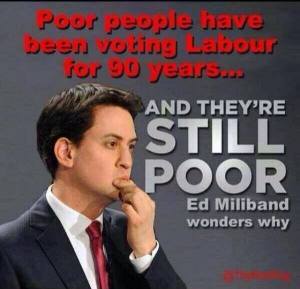
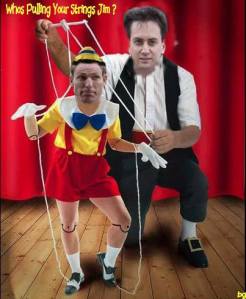
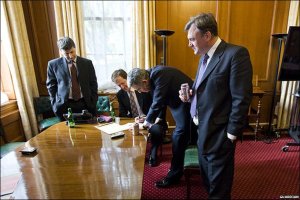
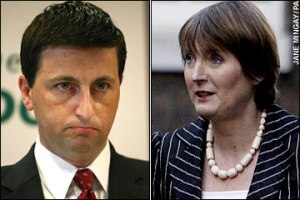
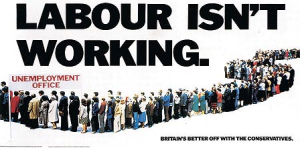

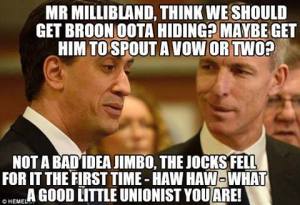
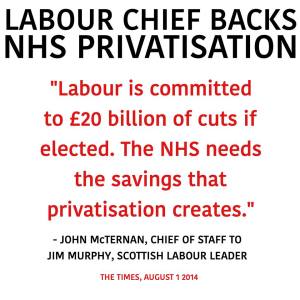

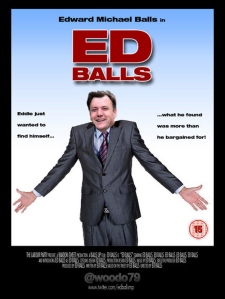



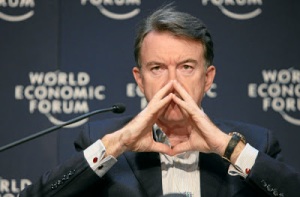
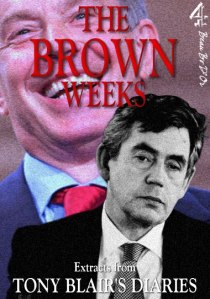
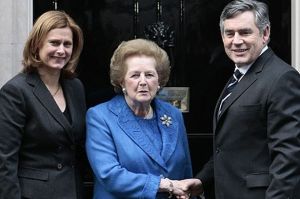
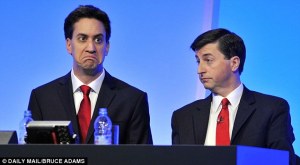
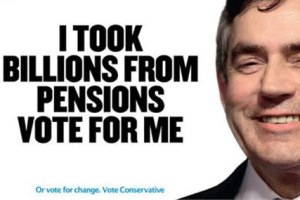
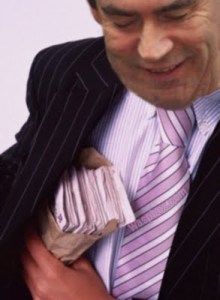
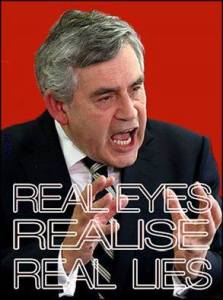

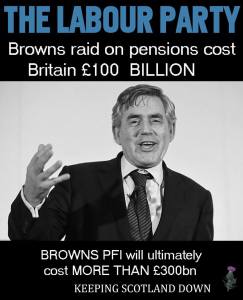
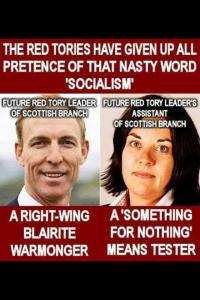

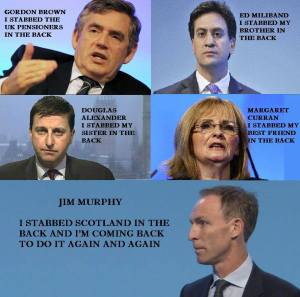

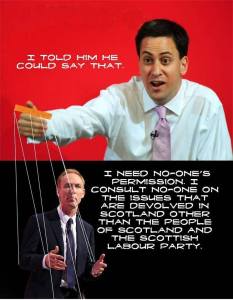




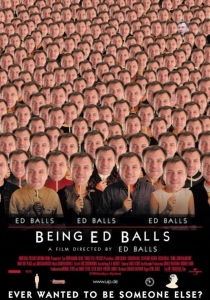

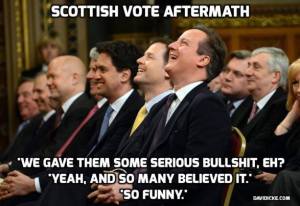



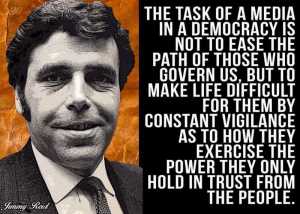



Leave a comment